- Home
- Cynthia Kadohata
Kira-Kira
Kira-Kira Read online
Contents
Acknowledgments
Chapter 1
Chapter 2
Chapter 3
Chapter 4
Chapter 5
Chapter 6
Chapter 7
Chapter 8
Chapter 9
Chapter 10
Chapter 11
Chapter 12
Chapter 13
Chapter 14
Chapter 15
Chapter 16
For Kim
For Stan
And for Sara
acknowledgments
The author would like to thank her editor and friend, Caitlyn Dlouhy; George Miyamoto; Natalie and Miles Bergner and their father, Dan; Kim, Steve, and Caroline Maire; Keith Holeman; Jeannette Miyamoto; and Sonoko Sakai.
chapter 1
MY SISTER, LYNN, taught me my first word: kira-kira. I pronounced it ka-a-ahhh, but she knew what I meant. Kira-kira means “glittering” in Japanese. Lynn told me that when I was a baby, she used to take me onto our empty road at night, where we would lie on our backs and look at the stars while she said over and over, “Katie, say ‘kira-kira, kira-kira.’” I loved that word! When I grew older, I used kira-kira to describe everything I liked: the beautiful blue sky; puppies; kittens; butterflies; colored Kleenex.
My mother said we were misusing the word; you could not call a Kleenex kira-kira. She was dismayed over how un-Japanese we were and vowed to send us to Japan one day. I didn’t care where she sent me, so long as Lynn came along.
I was born in Iowa in 1951. I know a lot about when I was a little girl, because my sister used to keep a diary. Today I keep her diary in a drawer next to my bed.
I like to see how her memories were the same as mine, but also different. For instance, one of my earliest memories is the day Lynn saved my life. I was almost five, and she was almost nine. We were playing on the empty road near our house. Fields of tall corn stretched into the distance wherever you looked. A dirty gray dog ran out of the field near us, and then he ran back in. Lynn loved animals. Her long black hair disappeared into the corn as she chased the dog. The summer sky was clear and blue. I felt a brief fear as Lynn disappeared into the cornstalks. When she wasn’t in school, she stayed with me constantly. Both our parents worked. Officially, I stayed all day with a lady from down the road, but unofficially, Lynn was the one who took care of me.
After Lynn ran into the field, I couldn’t see anything but corn.
“Lynnie!” I shouted. We weren’t that far from our house, but I felt scared. I burst into tears.
Somehow or other, Lynn got behind me and said, “Boo!” and I cried some more. She just laughed and hugged me and said, “You’re the best little sister in the world!” I liked it when she said that, so I stopped crying.
The dog ran off. We lay on our backs in the middle of the road and stared at the blue sky. Some days nobody at all drove down our little road. We could have lain on our backs all day and never got hit.
Lynn said, “The blue of the sky is one of the most special colors in the world, because the color is deep but see-through both at the same time. What did I just say?”
“The sky is special.”
“The ocean is like that too, and people’s eyes.”
She turned her head toward me and waited. I said, “The ocean and people’s eyes are special too.”
That’s how I learned about eyes, sky, and ocean: the three special, deep, colored, see-through things. I turned to Lynnie. Her eyes were deep and black, like mine.
The dog burst from the field suddenly, growling and snarling. Its teeth were long and yellow. We screamed and jumped up. The dog grabbed at my pants. As I pulled away, the dog ripped my pants and his cold teeth touched my skin. “Aaahhhhh!” I screamed.
Lynn pulled at the dog’s tail and shouted at me, “Run, Katie, run!” I ran, hearing the dog growling and Lynnie grunting. When I got to the house, I turned around and saw the dog tearing at Lynn’s pants as she huddled over into a ball. I ran inside and looked for a weapon. I couldn’t think straight. I got a milk bottle out of the fridge and ran toward Lynn and threw the bottle at the dog. The bottle missed the dog and broke on the street. The dog rushed to lap up the milk.
Lynn and I ran toward the house, but she stopped on the porch. I pulled at her. “Come on!”
She looked worried. “He’s going to cut his tongue on the glass.”
“Who cares?”
But she got the water hose and chased the dog away with the water, so it wouldn’t hurt its tongue. That’s the way Lynn was. Even if you tried to kill her and bite off her leg, she still forgave you.
This is what Lynn said in her diary from that day:
The corn was so pretty. When it was all around me, I felt like I wanted to stay there forever. Then I heard Katie crying, and I ran out as fast as I could. I was so scared. I thought something had happened to her!
Later, when the dog attacked me, Katie saved my life.
I didn’t really see things that way. If she hadn’t saved my life first, I wouldn’t have been able to save her life. So, really, she’s the one who saved a life.
Lynn was the bravest girl in the world. She was also a genius. I knew this because one day I asked her, “Are you a genius?” And she said, “Yes.” I believed her because the day my father taught her how to play chess, she won her first game. She said she would teach me how to play if I wanted. She always said she would teach me everything in the world I needed to know. She said we would be rich someday and buy our parents seven houses. But first they would buy a house for all of us. That wonderful day was not far off. I found this out one afternoon when Lynn pulled me into the kitchen, her eyes shining. “I have to show you something,” she said.
She reached under the refrigerator and pulled out a tray. A worn envelope sat inside. She opened the envelope up and showed me what was inside: cash.
“Is that real?” I said.
“Uh-huh. It belongs to Mom and Dad. It’s for our house we’re going to buy.”
We lived in a little rented house in Iowa. I liked our little rented house, but Lynn always told me I would love our very own house. Then we could get a dog, a cat, and a parakeet.
Lynn looked at me expectantly. I said, “Doesn’t money belong in a bank?”
“They don’t trust the bank. Do you want to count it?”
She handed me the envelope, and I took the money in my hands. It felt damp and cool. “One, two, three . . .” I counted to eleven. Eleven hundred-dollar bills. I wasn’t sure what to think. I found a dollar once in a parking lot. I bought a lot of stuff with that. With eleven hundred dollars, it seemed you could buy anything. “I hope our house is painted sky blue,” I said.
“It will be.” She put the money back. “They think it’s hidden, but I saw Mom take it out.”
Our parents owned a small Oriental foods grocery store. Unfortunately, there were hardly any Oriental people in Iowa, and the store went out of business shortly after Lynn and I first counted the money under the refrigerator. My father’s brother, my uncle Katsuhisa, worked in a poultry hatchery in Georgia. He said he could get my father a job at the hatchery. And, he said, he could get my mother a job working in a poultry processing factory. A few weeks after the store went out of business, my father decided to take us down to Georgia to join the poultry industry.
So we owed Uncle Katsuhisa a big favor for helping us. Katsu means “triumph” in Japanese. For some reason I always thought “triumph” and “trumpet” were the same thing, and I thought of my uncle as a trumpet.
Lynn said Uncle Katsuhisa was an odd fish. He was as loud as my father was quiet. Even when he wasn’t talking, he made a lot of noise, clearing his throat and sniffing and tapping his fingers. Sometimes, for no reason t
hat I could see, he would suddenly stand up and clap his hands together really loudly. After he got everyone’s attention, he would just sit down again. He even made noise when he was thinking. When he was deep in thought, he had a way of turning his ears inside out so they looked kind of deformed. The ears would make a popping sound when they came undone. Lynn said you could hear him thinking: Pop! Pop!
A buttonlike scar marked one side of Uncle Katsuhisa’s nose. The story was that when he was a boy in Japan, he was attacked by giant crows, one of which tried to steal his nose. He, my father, and my mother were Kibei, which meant they were born in the United States but were sent to Japan for their education. The crows of Japan are famous for being mean. Anyway, that was the story Lynn told me.
It was a sweltering day when Uncle Katsuhisa arrived in Iowa to help us move to Georgia. We all ran outside when we heard his truck on our lonely road. His truck jerked and sputtered and was generally as noisy as he was. My mother said, “Will that truck make it all the way to Georgia?”
My father hit his chest with his fist. That’s what he did whenever he wanted to say, Definitely! He added, “He’s my brother.” Our father was solid and tall, six feet, and our mother was delicate and tiny, four feet ten. As tiny as she was, she scared us when she got mad. Her soft face turned hard and glasslike, as if it could break into pieces if something hit it.
As my parents watched Uncle’s truck my father reached both of his arms around my mother, enveloping her. He stood with her like that a lot, as if protecting her.
“But his being your brother has nothing to do with whether the truck will make it all the way to Georgia,” my mother said.
My father said, “If my brother says it will make it, then it will make it.” He didn’t seem to have a doubt in the world. His brother was four years older than he was. Maybe he trusted Uncle Katsuhisa the way I trusted Lynn. Lynn whispered to me, “Frankly, I wonder whether the truck will make it all the way up the road to our house, let alone to Georgia.” “Frankly” was her favorite word that week.
Our mother looked at us suspiciously. She didn’t like it when we whispered. She thought that meant we were gossiping, and she was against gossiping. She focused on me. She was trying to read my mind. Lynn said whenever our mother did that, I should try to think nonsense words in my head. I thought to myself, Elephant, cow, moo, koo, doo. Elephant . . . My mother turned back around, to watch the truck.
When the truck finally rumbled up, Uncle Katsuhisa jumped out and immediately ran toward Lynn and me. I stepped back, but he swooped me up in his arms and shouted, “My little palomino pony! That’s what you are!” He twirled me around until I felt dizzy. Then he set me down and picked up Lynn and twirled her around and said, “My little wolfie girl!”
He set Lynn down and hugged my father hard. He hugged my mother delicately. While Uncle hugged my mother, she turned her face away a bit, as if his loudness made her feel faint.
It was hard to see how my father and Uncle Katsuhisa could be related. My father was mild, like the sea on a windless day, with an unruffled surface and little variation. He was as hard as the wall in our bedroom. Just to prove how strong he was, he used to let us hit him in the stomach as hard as we could. Some days we would sneak up on him and punch him in the stomach, and he never even noticed. We would sneak away while he kept listening to the radio as if nothing had happened.
My father liked to think. Sometimes Lynn and I would peek at him as he sat at the kitchen table, thinking. His hands would be folded on the table, and he would be frowning at nothing. Sometimes he would nod, but only slightly. I knew I would never be a thinker like my father, because I couldn’t sit that still. Lynn said he thought so much that sometimes weeks or even months passed before he made a decision. Once he decided something, though, he never changed his mind. He’d thought many weeks before deciding to move us to Georgia. By the time he decided, there was only six hundred dollars in cash left in the envelope under the refrigerator.
The night Uncle Katsuhisa arrived in Iowa, he left the dinner table early so he could go out and take a walk and maybe talk to himself. After the front door closed, my mother said that Uncle Katsuhisa was the opposite of my father in that he didn’t look before he leapt, didn’t think at all before he made decisions. She lowered her voice and said, “That’s why he married that woman,” meaning his first wife. Strictly speaking, Mom was gossiping, but who was going to tell her? We all sat silently.
My father and uncle were different in other ways. Uncle Katsuhisa liked to talk to anyone, even to himself. My father didn’t like to talk, except to my mother. He preferred to read the newspaper. My uncle, on the other hand, never read the paper. He did not give a hoot what President Eisenhower had to say.
My uncle was exactly one inch taller than my father. But his stomach was soft. We knew this because we hit him in it once the year before, and he yelped in pain and threatened to spank us. We got sent to bed without supper because my parents said hitting someone was the worst thing you could do. Stealing was second, and lying was third.
Before I was twelve, I would have committed all three of those crimes.
chapter 2
ALL THE DAY before we moved, my father and uncle loaded the truck with boxes that my mother had packed. We planned to leave first thing the next morning. Lynn and I sat out on the front porch and watched them work. Uncle Katsuhisa didn’t want us to help because he said we got in a man’s way.
Lynn and I played soldier with the chess set. During a break, Uncle Katsuhisa walked onto the porch, clapped his hands three times, took out a handkerchief, and blew his nose. He clapped his hands again. “I’m the best Japanese chess player I know,” he said. That was a challenge to Lynn. “Are you up to a game?”
She set up the board. He rolled up his sleeves, as if chess were hard, physical work. Lynn beat him in about fifteen minutes. He was not a good sport and made her play him again and again so he could beat her. My father returned to loading up the truck, but Uncle Katsuhisa didn’t even notice. He lost three games! He said again that he thought of himself as the best Japanese chess player in the whole United States. I have no idea where he got that idea of himself. When Lynn beat him, I kept my face blank, but inside I was cheering for her.
After Uncle’s third loss he stepped off the porch and stared moodily across the gravel yard. He started making noises in his throat. He said, “Yah! Ooo-YAH! Gaaaaaaah! Gaaaaaaaah! Gaaaaaaah! Hocka-hocka-hocka! Geh-geh-geh-geh-geh!!” And then a glob of saliva flew like a baseball from his mouth and over the gravel. It landed on our only tree and dripped slowly down the bark. Lynn and I looked at each other, and she raised her eyebrows as if to say, See, I told you he was an odd fish.
We were poor, but in the way Japanese are poor, meaning we never borrowed money from anyone, period. Meaning once a year we bought as many fifty-pound bags of rice as we could afford, and we didn’t get nervous again about money until we reached our last bag. Nothing went to waste in our house. For breakfast my parents often made their ochazuke—green tea mixed with rice—from the crusty old rice at the bottom of the pot. For our move to Georgia, Dad and Uncle loaded up the truck with all the bags of rice that we hadn’t sold at the store. I watched my parents look at the rice in the truck, and I could see that the rice made them feel good. It made them feel safe.
I liked to see them that way, especially my mother, who never seemed to feel safe. My mother was a delicate, rare, and beautiful flower. Our father told us that. She weighed hardly more than Lynn. She was so delicate that if you bumped into her accidentally, you could bruise her. She fell down a single stair once, and she broke her leg. To her that was proof even a single stair could present peril. When I would approach even a single stair, she would call out, “Be careful!”
Our mother didn’t like us to run or play or climb, because it was dangerous. She didn’t like us to walk in the middle of our empty street, because you never knew. She didn’t want us to go to college someday, because we might get strang
e ideas. She liked peace and quiet. My father used to say, “Shhhh. Your mother is taking a bath.” Or, “Quiet down, girls, your mother is drinking tea.” We never understood why we couldn’t make noise while our mother was doing anything at all. My mother’s favorite thing to tell us, in her iron-rimmed singsong voice, was “Shizukani!” That means “Hush!”
She never said “Shizukani!” to my father. She made him food and rubbed his feet, and for this he let her handle all the money. Lynn said our mother probably knew a special foot-rubbing technique that made men silly. My father loved my mother a lot. That made me feel safe.
The night before we moved, my father and uncle sat on a tree stump across the road. Lynn and I peeked out at them before we got in bed. My uncle talked and talked, and my father listened and listened. Sometimes they both laughed loudly.
“What are they talking about?” I said.
“Women,” Lynn said knowingly.
“What are they saying about women?”
“That the pretty ones make them giggle.”
“Oh. Good night.”
“Good night!”
Our mother came into the bedroom in the middle of the night, the way she always did, to make sure we were asleep. As usual, Lynn was asleep and I was awake. If I was awake, I usually pretended to be asleep so as not to get in trouble. But tonight I said, “Mom?”
“It’s late, why are you up?”
“I can’t sleep without Bera-Bera.” Bera-Bera was my favorite stuffed animal, which my mother had packed in a box. Bera-Bera talked too much, laughed too loudly, and sometimes sassed me, but still I loved him.
“Someday you won’t even remember Bera-Bera.” She said this gently, and as if the thought made her a little sad. The thought made me a little sad too. She kissed my forehead and left. Outside I could hear noises: “Yah! Ooooh-YAH!” Et cetera. Lynn was sound asleep. I got up and watched Uncle Katsuhisa spit. My father no longer sat on the tree stump. It was just Uncle Katsuhisa out there. He was a madman, for sure.

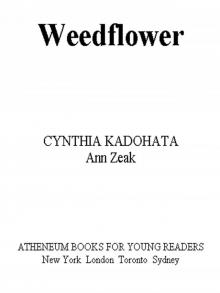 Weedflower
Weedflower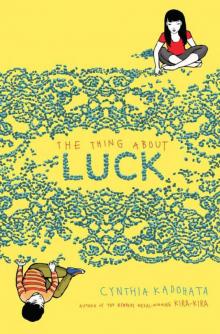 The Thing About Luck
The Thing About Luck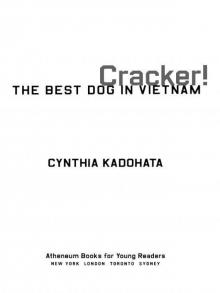 Cracker!: The Best Dog in Vietnam
Cracker!: The Best Dog in Vietnam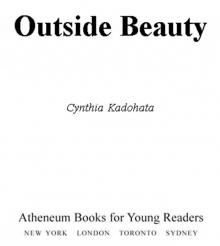 Outside Beauty
Outside Beauty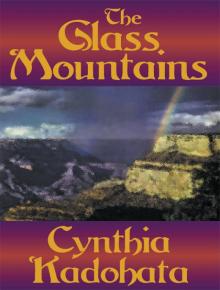 The Glass Mountains
The Glass Mountains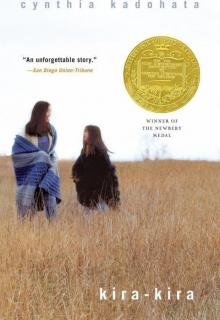 Kira-Kira
Kira-Kira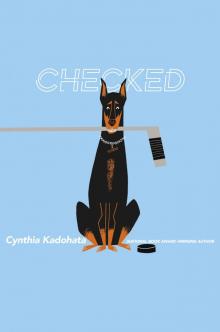 Checked
Checked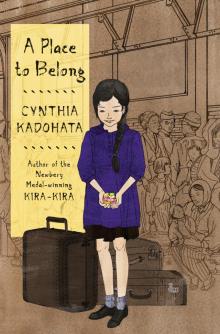 A Place to Belong
A Place to Belong A Million Shades of Gray
A Million Shades of Gray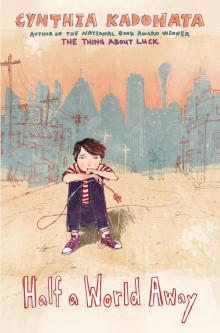 Half a World Away
Half a World Away